Romania News: Newspapers, News Platforms, New Media
For those following us for a while, you all know we try to cover all aspects of Romanian news, from politics and economics, and all that happens in Romania and matters to European and worldwide lobbyists.
We cannot cover all the Romanian news, though. Anybody who wants to stay up-to-date with the latest news from Romania might do so by exploring various print newspapers, online news platforms, and new media that we present here today. Most of them have English versions, so switching to English at any time on their online platforms would be easier.
In this article, we’ll take a closer look at some of the top sources for news from Romania across different mediums.
Romania News in English
Romania Insider
Romania Insider is a leading English-language news source in Romania that provides daily updates on politics, business, culture, and travel. They have a team of experienced journalists covering a wide range of topics, ensuring readers get a comprehensive view of what’s happening in Romania.
They miss the in-depth analysis of subjects, as they keep anything at the fact level, without any comments or internal opinions, in any direction. While on their platform, news can be read but also missed equally. This is why we always say Romania Insider is the best source of news but not of information, and this is quite a difference.
Valahia News
Valahia News is another English-language news platform covering Romania’s latest news. They focus on politics, economy, culture, and sports. Their well-researched articles provide in-depth analysis, making them a go-to source for news enthusiasts. We noticed some of their articles are documented extensively, presenting facts and what happens behind the scenes.
Notably, Valahia News was chosen by Visit Bucharest as their media partner, so this might explain why they are among the preferred English news platforms in Romania. Also, we check their platform for opinions on what’s happening in Romania, as they tend to present everything more casually and more friendly.
Romania Journal
The Romania Journal is a daily news portal in English covering all aspects of Romanian society, politics, economy, sports, and culture. They also have a team of journalists who provide high-quality news coverage emphasizing accuracy and objectivity.
News from Romania in Print Newspapers
Print newspapers remain an essential news source in Romania, despite the rise of new media platforms. Leading publications such as Adevarul, Evenimentul Zilei, Romania Libera and Gazeta Sporturilor continue to deliver breaking news on various topics, including business, agriculture and development.
Adevarul
Adevarul is one of the oldest newspapers in Romania, dating back to 1888. Today, Adevarul covers breaking news and current events across Romania’s politics, business, agriculture and development.
The current status quo of Adevarul reflects its commitment to providing quality journalism and engaging content for its readership. The newspaper has adapted well to new media platforms, such as online news websites and social media pages that offer round-the-clock updates on different areas of interest.
Evenimentul Zilei
Evenimentul Zilei is a Romanian daily newspaper that provides a comprehensive overview of the latest news in Romania. Its coverage extends to breaking news, business, development, and agriculture. The newspaper has significantly impacted Romanian politics and society by providing unbiased reporting and stimulating public discourse.
Compared to other print newspapers in Romania, such as Adevarul or Romania Libera, Evenimentul Zilei stands out with its focus on current events and hard-hitting journalism.
Romania Libera
Romania Libera, a historical newspaper with over 100 years of publishing history, holds significant importance in Romanian journalism. While recent changes and transformations have occurred within its editorial team, Romania Libera still upholds its reputation for delivering quality news coverage to readers.
Controversial issues are not shied away from by Romania Libera. From politics to agriculture, breaking news stories and business development updates are covered professionally without bias or sensationalism. The views presented on these topics aim to inform rather than provoke reactions from the reader base.
Gazeta Sporturilor
Gazeta Sporturilor is a leading sports newspaper in Romania known for its extensive coverage of sports events across various mediums. The newspaper has employed some of the most famous sports journalists who have contributed to its success. Their in-depth analysis and reporting have helped shape perceptions about Romanian athletes and their achievements on the international stage.
Through its coverage, Gazeta Sporturilor plays a significant role in promoting Romanian athletics and inspiring young talent to pursue their dreams. The newspaper’s comprehensive reporting also helps keep readers informed about breaking news related to developments in various sporting fields, ranging from agriculture-based competitions like equestrianism to business-oriented events such as stock car racing.
Online News Platforms
Online news platforms have become the go-to source for Romania news and European news enthusiasts. Digi24, Hotnews, Mediafax, and Ziarul Financiar are some of the most popular online Romanian news sources that offer up-to-date coverage on various topics, from politics to business.
Thanks to their digital presence, these platforms provide readers with real-time reporting and in-depth analysis of current events locally and internationally. With so many options available at one’s fingertips, staying informed about everything in Romania has never been easier or more accessible.
Digi24
Digi24 is a popular news platform in Romania that provides up-to-date information on various topics. It comprehensively covers politics, business, technology, and entertainment news. Digi24 also features live streaming of important events and breaking news updates.
Yet, Digi24 is seen as a news station close to the progressists. This is why they were the leading TV station to persuade people to take the jab during the pandemic and support USR – Save Romania Union, a political party known for promoting far-right left ideas and progressivism.
Hotnews
Hotnews is a leading news platform in Romania that covers various topics ranging from politics to culture. Founded in 2001, the website has become a go-to source for up-to-date and credible news for Romanian citizens and European news enthusiasts. The editorial policy at Hotnews is based on objectivity, accuracy, and transparency, ensuring the highest journalistic standards.
The articles published by Hotnews cover a wide range of topics such as breaking news stories, in-depth analysis of current affairs, sports events coverage, business updates and technology advancements.
Mediafax
Mediafax is a leading Romanian news agency covering various topics, including politics, economics, social issues, sports and entertainment. Their role in the country’s media landscape is crucial as they are relied upon for breaking news and analysis.
To ensure accurate reporting, Mediafax sources its information from reliable sources such as government officials, experts in their respective fields and eyewitnesses to events. This commitment to quality journalism has earned their audience’s trust and allowed them to maintain their position as one of the most respected news agencies in Romania.
Ziarul Financiar
Ziarul Financiar is a Romanian newspaper and online business and financial news platform in circulation since 2001. Its focus is on financial news, and it has gained a reputation for being one of Romania’s most reliable business information sources.
What sets Ziarul Financiar apart from other newspapers in Romania is its deep understanding of its economy. The editorial team comprises finance experts who provide insightful analysis and commentary on economic trends, both locally and globally. The paper’s commitment to accuracy, reliability, and impartial reporting has earned it a large following among businesses, investors, policymakers, economists, and others interested in keeping up with financial news.
New Media
With platforms like Rise Project, readers can access in-depth investigative journalism that traditional newspapers may not cover. Additionally, news websites like Stiripesurse.ro and PressOne offer a variety of articles covering local and European news to keep Romania’s news enthusiasts informed.
These new media sources have become increasingly popular due to their ability to provide fresh perspectives and independent reporting. They also allow for a more interactive experience where readers can engage through comments or social media shares, making it easier than ever before to stay updated on Romania’s current events.
Rise Project
The Rise Project is a Romanian investigative journalism project that exposes corruption scandals and social justice news. Their team of experienced journalists works tirelessly to uncover hidden truths and bring them to light for the public’s benefit.
Here are some highlights from their recent work:
- Exposing corrupt politicians who have misused public funds for personal gain
- Investigating unethical practices within large corporations
- Reporting on social justice issues, such as human rights violations
Stiripesurse.ro
Stiripesurse.ro is a go-to platform for the latest breaking news in Romania. From politics to entertainment, it offers an extensive range of topics that cater to all interests. Moreover, its economic updates and analysis provide valuable insights into the financial landscape of Romania. Recently, they have started taking over news in English from Agepress, thus offering English readers a glimpse of what’s happening in Romania.
PressOne
PressOne is a Romanian news platform that provides in-depth reportage on social issues and human interest stories from Romania and abroad. The platform also runs „Fact-Checking” initiatives to debunk fake news, making it a reliable source of information for news enthusiasts and those interested in European news.
Where can I find reliable news sources about Romania?
As with any country, finding reliable news sources about Romania is crucial to stay informed about its current events and developments. Fortunately, several reputable sources are available for those interested in Romanian news.
A reliable source is the English-language version of Romania’s largest newspaper, Adevarul. They provide in-depth coverage of national and international news, making it an excellent resource for those interested in European news.
Ziarul Financiar is a trusted source in Romania for business and economic news. They cover stock market updates, business trends, and economic policies.
Finally, Romania-Insider.com or Valahia.news are popular English-language news platforms that provide a broad range of news and information about Romania. They cover politics, business, travel, cultural events, and lobbying in Romania.
By following these sources, you can stay informed about the latest developments in Romania and have a deeper understanding of the country’s culture, politics, and economy.
Are there any emerging trends in Romanian news?
As a rapidly developing and modernizing country, Romania has always been an essential news source for those interested in European affairs. Several emerging trends in Romanian news have been worth paying attention to in recent years.
The country’s growing economic strength is one of the most significant trends in Romanian news. Romania has experienced steady economic growth in recent years, reflected in the news coverage. There has been a lot of coverage of new investment and development projects and the increasing number of Romanian businesses expanding into international markets.
Another trend that has emerged in Romanian news is the growing importance of technology. Romania is home to a rapidly expanding tech sector, which has been reflected in the news coverage. There has been a lot of coverage of new startups and the growing use of technology in industries such as healthcare and finance.
In addition to these trends, there has also been a growing focus on political issues in Romanian news. Romania has been through political instability in recent years, and there has been a lot of coverage of political scandals and protests. There has also been a growing focus on corruption and the rule of law.
Overall, several emerging trends in Romanian news are worth paying attention to. Whether you are interested in the country’s growing economy, tech sector, or political landscape, there is always something new and exciting to discover in the news coming out of Romania.
- Published in News
The State of Press Freedom in Romania Declines
Freedom of the press is a democratic cornerstone in the European Union (EU). Nevertheless, recent results from the Civil Liberties Union for Europe show that freedom of information and expression in several EU nations, including Romania, is jeopardized by inadequate actions to safeguard national security, tackle hate speech, and counteract disinformation.
Moreover, the imbalanced application of data protection regulations and sluggish processing of information freedom requests obstruct the unimpeded flow of information. This overview of the present state of press freedom emphasizes some of the obstacles journalists face in the EU, focusing on Romania, as derived from the latest State of Press Freedom in the EU report.
In Romania, national security is being utilized as a pretext for restricting freedom of expression. The report’s findings reveal that in countries like Romania and Slovakia, growing apprehensions have emerged that national security is being exploited as a justification to formulate laws limiting freedom of expression. Such legislation frequently endangers media freedom and restricts journalists’ and media outlets’ capacity to report on crucial matters.
As cited in the report, there is no transparency in Romania regarding funding allocation by political parties. Public funds are employed to pay media outlets, as occurred during the pandemic. In this manner, newspapers have transformed into political party propaganda instruments. Civil society actors have tried to reveal this issue through freedom of information requests, but the parties have refused to divulge information.
There was an intention to support the press during the pandemic. However, beyond the Government’s intention, one cannot help but wonder: how many publications refrained from criticizing the authorities simply because they were paid with public funds?
The Emilia Șercan case is detailed separately in the report. Emilia Șercan, a Romanian investigative journalist, published an investigation in early 2022 alleging Romania’s Prime Minister plagiarized his doctoral thesis. Shortly afterward, Șercan received a threat from an unknown person containing her photos. Despite reporting the incident to the police, the screenshots she sent were leaked, prompting her to file numerous criminal complaints against the police and the Minister of Interior. The journalist’s case is the subject of seven criminal cases at various stages in several institutions.
Notably, officers from the Romanian Police Academy are indicted in this case, as they are charged with threatening the journalist to abandon the investigation.
The report mentions that civil rights organizations in Bulgaria, Estonia, Hungary, Ireland, Poland, Romania, Slovakia, Slovenia, and Spain report increased censorship and content restrictions. Public order and security are being used as arguments to propose new laws allowing for even further restrictions on free speech.
This is not good news for the evolution of the Romanian press or civil society, as pressures against the press mean less information and less freedom for society.
As the European Union continues to grapple with the challenges surrounding freedom of expression and information, it is essential to protect the rights of journalists and media outlets to ensure a healthy democratic environment. The abovementioned cases are just a few examples of journalists’ and civil society actors’ ongoing struggles. Ultimately, the EU must address these issues and ensure that the fundamental principles of press freedom are upheld.
- Published in News
Romanians’ Trust in EU Collapses
According to Valahia News, the Romanians’ trust in the European Union collapses. This is what the latest Eurobarometer says about the trust the Romanian people lost, especially during the last two years in the EU and the European institutions.
In particular, trust decreased by roughly 10% during the past two years. Only 46% of Romanians see participation in the EU favorably, down from 55% in 2020. Romania has significantly slipped below the EU average in this area, which is currently 62% and is expected to rise from 59% in 2020.
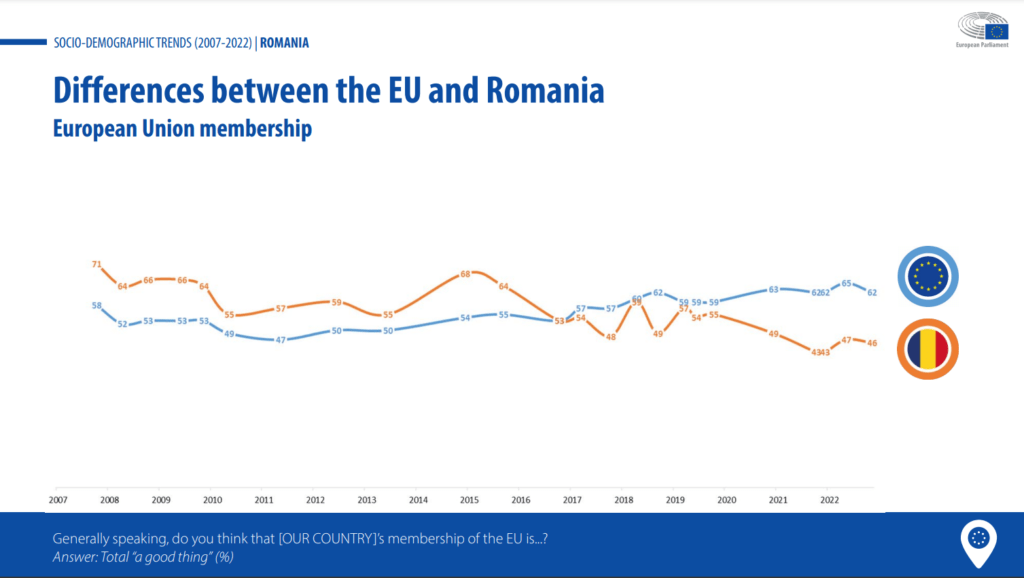
Not only that but the proportion of individuals who still believe that being a part of the EU benefits them fell from 72% in 2020—which was and remains the average for Europe—to 62% presently. In just two years, there has been a 6% decline.
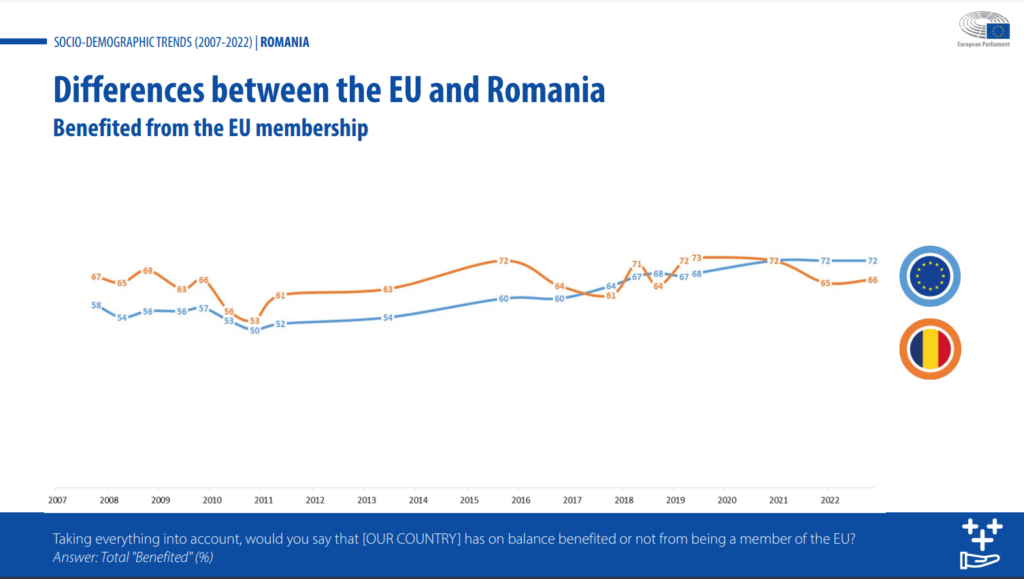
39% of Romanians who were asked why they valued their country’s participation in the EU said it was for the employment prospects. This is due to the fact that millions of Romanians labor overseas. On the other side, the study reveals that Romania falls well short of the EU average in terms of valuing the EU’s economic contribution to the development of the nation or its contribution to restoring peace and security in Romania. Given the EU’s failure to solidify the peace in the region, it is understandable why they think this way. The Romanian people don’t notice much of an impact from the EU, just from NATO, as the so-called „special operation” is taking place close by.
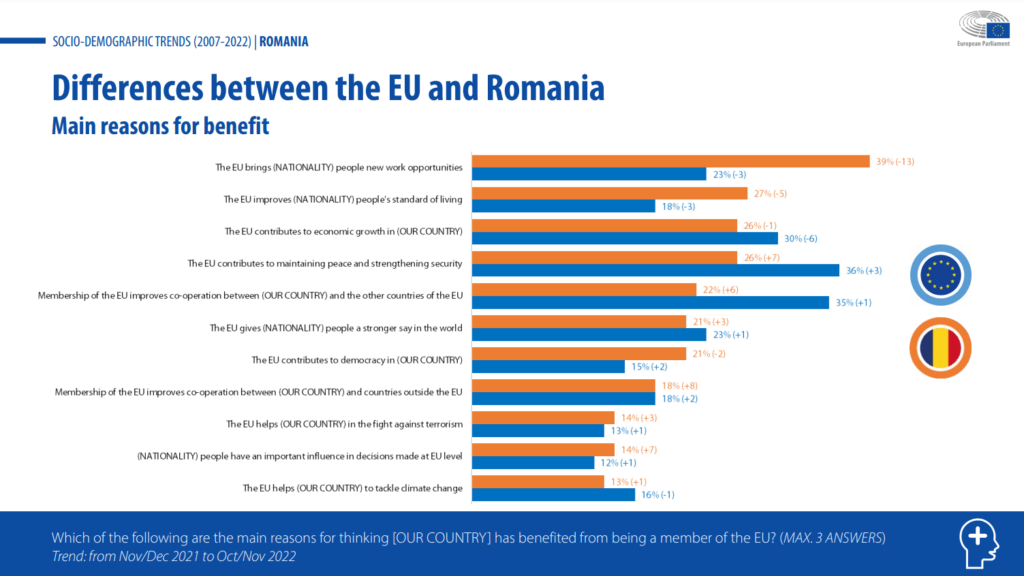
How did Romanians lose trust in their leaders and the EU and why did this happen?
Although the pandemic may have been a major factor in this, we must admit that Romanian officials may have had a part to play. The lawmakers merely seemed to the Romanians as a group of individuals who faithfully carried out EU directives. Romania implemented one of the most autocratic regimes during the pandemic to impose quarantine regulations on its inhabitants. The government once sent personnel armed with heavy machine guns and military trucks onto the streets to deliver a straightforward message: we set the rules now!
Romania also demonstrated unrestricted devotion to Brussels by spending billions and purchasing tens of millions of vaccination shots, just to dispose them now that they had expired. These may be the main reasons why the country is losing trust in the EU.
Also, the recent developments at the European level made more Romanians reject European values. While keeping Romania out of Schengen, European politicians should consider that the country could retaliate. Boycotts against Western companies are underway in Romania. Instead of understanding the people and trying and fulfill their rightful demands, politicians in Bruxelles blame the Russian rhetoric whenever they spot opposition to the European institutions.
Now, the Romanian Government and the country’s elites reap what they sow: the lack of trust of Romanians in the European institutions is only the consequence of how the politicians in Bruxelles and Bucharest treated the population. Suppose anyone in Bruxelles would like to change the current trend and the widening gap between the Romanians and the EU. In that case, they should try and understand that it’s not Russia to be blamed but their own decisions and behaviour.
- Published in News
Digital Nomad Law Romania: Advantages and Requirements
Foreigners coming to Romania for a more extended period of time and working remotely for a non-EU company will benefit from tax breaks following the adoption by Parliament of the bill to clarify the tax regime for digital nomads.
Specifically, digital nomads will be able to choose Romania as their destination without worrying about double taxation of income earned outside Romania. They will be exempt from paying income tax, social security, and health insurance contributions.
Romanian MP Diana Buzoianu states that Romania has the potential of becoming a destinated demanded by digital nomads, as the country has extraordinary tourism potential. However, in order to accomplish this, the state must provide a clear tax regime for digital nomads who would like to choose Romania as their destination country.
Romania is a country with a lot of potential and benefits: the country’s fixed-line broadband package average monthly rates, at $8.15, which is a lot cheaper in comparison to other EU countries. Romania might be the ideal location for someone who is seeking affordable, dependable internet connectivity.
Digital nomad in Romania – what are the advantages?
With an average broadband internet speed of 188 mb/s, an internet cost of €7.5 and an affordable rent of around €323, Romania has long been considered one of the best places to work remotely in the Central and Eastern European region.
Additionally, Romania offers reliable and fast internet service, making it an ideal location for those who require a stable online connection, such as those who need the best WordPress hosting.
The language is also an important aspect when moving to a foreign country, as in Romania, English is spoken on a large scale, so there is no language barrier.
Restaurants, clubs, and pubs are affordable, so it is easy to eat a good meal and feel good with little money.
Also, Bucharest, the capital of Romania offers a multitude of amazing touristic attractions to visit.
What are the requirements to work as a digital nomad in Romania?
The long-stay visa is granted by the diplomatic missions and consular offices of Romania in the country where the digital nomads have their residence or domicile. The conditions they must meet to obtain the visa are:
- have means of subsistence from the activity carried out, amounting to at least three times the average gross monthly earnings in Romania for each of the last 6 months preceding the submission of the visa application and for the entire period of the visa
- carry out the activities from which they derive their income remotely using information and communication technology
In order to obtain a digital nomad visa, digital nomads who meet the above-mentioned conditions will have to present a number of documents:
- employment contract concluded with the company registered abroad / proof of at least 3 years of management of the company registered abroad – in original and accompanied by an authenticated translation into Romanian
- a document issued by the company with which the foreigner has concluded an employment contract/which the foreigner owns, presenting its identification and contact data (including the field of activity and, if applicable, the foreigner’s participation in the company, as well as data on its legal representatives) – in original and accompanied by an authenticated translation into Romanian
- letter of intent detailing the purpose of the trip to Romania and the activities the foreigner intends to carry out – in original and accompanied by an authenticated translation into Romanian
- apostilled or super-certified document issued by the specialized institution of the public administration of the place of tax residence, certifying that the foreigner employed/company owned by the foreigner has paid taxes, duties, and other compulsory contributions up to date and is not registered for tax evasion or tax fraud – in original and accompanied by an authenticated translation into Romanian
- reservation of a valid travel ticket or driving license, together with proof of itinerary, in the case of drivers
- proof of medical insurance for the entire duration of validity of the visa, valid on the territory of Romania and covering at least EUR 30 000
- proof of means of support amounting to at least three times the average gross monthly earnings in Romania
- proof of accommodation
- criminal record certificate or another document with the same legal value, apostilled or super-stamped, certifying that there are no records of criminal offenses – accompanied by an authenticated translation into Romanian
- other supporting documents that the competent Romanian authorities require in addition to the above.
Thus, digital nomads will henceforth be included in the category of foreigners eligible for a long-stay visa, on the essential condition that their gross monthly income is at least three times higher than the average income of Romanian nationals. This means that future digital nomads will have to earn around €3 300 per month from remote work in Romania to be eligible for a visa.
- Published in News
Romania Prepares to Forbid Gambling Advertising
Stormy times are ahead for Romania’s gambling and betting industry if the newly initiated law is passed.
According to Valahia News, the law draft follows the decision of the WHO – World Health Organization. The organization included gambling addiction among the most severe psychic disease. Also, the law’s initiators motivated the initiative by the numerous suicide cases following gambling loss.
Average education is a characteristic of gamblers, and, likely, this is also true of people who emotionally respond to online or television advertisements.
The Romanian gambling industry contributes to the state budget with more than EUR 600 million in yearly taxes and hires 45,000 workers.
According to the latest study on the industry, 15% of the Romanian population over 18 had gambled at least once in the last year. One Romanian man out of 4 had gambled at least once in the last year at the time of the study, while the percentage of women who ticked this activity was 7%. The profile of loyal customers, who play at least once a week, consists of men between 18 and 24, single and from the urban environment.
On the other hand, the most current survey shows that Romania is comparable to the rest of Europe, with 0.5–2% of the population over 18 who are serious gamblers. This indicates that Romania’s gambling sector does not produce more addicts than the industry in developed nations, although playing responsibly ought to be more than just a catchphrase.
More sectors will be affected. The first is the gambling sector, but there will also be others, like the media sector, TV networks, and online platforms. Lastly, the Romanian state would suffer because the money would not reach the public budget.
Online casinos in Romania are prosperous, and this is not something to be hidden. We see casino sponsorship everywhere, including in sports. In Romania, top football teams, such as Dinamo Bucharest or FCSB, and many others, have casino brands on their T-shirts. While clamping on casino advertising, won’t these clubs be affected?
A reply is to be issued by the Romanian associations for gambling.
- Published in News
Romanian oncology introduces AI: Docviser oncology platform
The fight against cancer is challenging for doctors, oncology researchers and patients. Romania is currently one of the countries offering state-of-the-art solutions based on Artificial Intelligence to make the entire process of treatment and healing of patients more efficient.
AI is replacing humans at a rapid pace, but we still wonder. We don’t know; we only know the era of AI is here, and from doctors to marketers and decision-makers, no job is safe for the artificial intelligence revolution.
MCRO, one of the most reputable software development companies in Cluj Napoca, launched Docviser, the first oncology healthcare application in Romania, dedicated to improving the collaboration between doctors and the care of cancer patients.
Docviser is a product that incorporates Artificial Intelligence to extract relevant data and provide the best results to improve medical decisions for those who use it. And the numbers so far are highly encouraging.
Since the launch of this application, it has been used by 99 doctors, nurses and pharmacists from 29 clinics registered in the application.
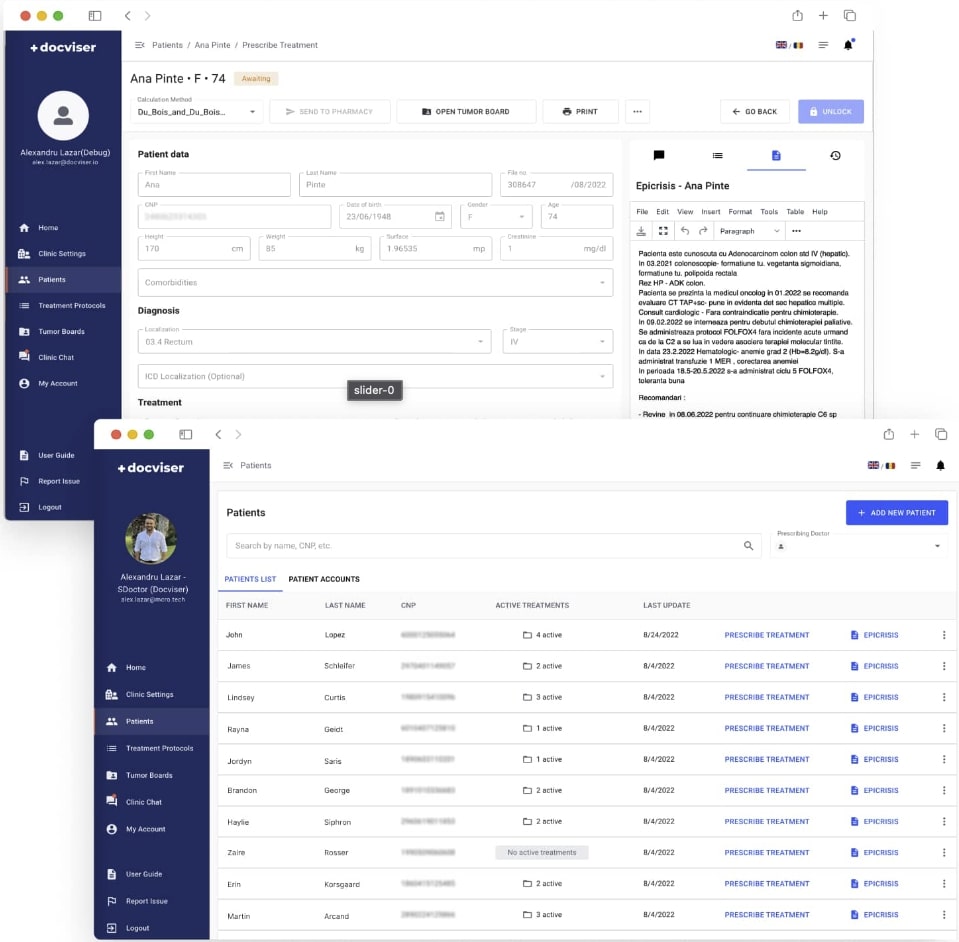
Artificial Intelligence helped all these specialists to prescribe 5106 drugs and treatment schemes and monitor treatment progress for the benefit of 1876 patients. During all this time, the platform supported establishing remote medical commissions to analyze 67 complex cases requiring multidisciplinary decision-making, with specialists located in different locations.
Docviser involves intelligently prescribing treatment through the continuous development of an artificial intelligence model. It recommends the optimal treatment in each case, taking into account both the active substance through the treatment protocol and the dose prescribed based on the one calculated and adjusted according to comorbidities, creatinine level and other relevant indicators that will appear in the future.
The product was developed with the direct involvement of oncologists, adapted to their needs and streamlines the flow of information from the patient to doctors, medical staff and pharmacists, offering real-time progress on the status of the treatment protocol.
The process of using Docviser involves oncologists but also assistants and pharmacists:
- Clinic doctors upload all patient data and initial diagnosis.
- For each case, a treatment protocol is assigned with the drug and dose recommended by the platform, or the doctor can decide to prescribe a new treatment.
- Once the treatment protocol is validated, it is sent to the pharmacy for preparation.
- As soon as the treatment is prepared, it is sent to the nurse to be administered to the patient.
Throughout the process, all the medical personnel involved in the patient’s treatment receive, depending on the level of access, live notifications about the status of the treatment protocol. Doctors can communicate through the web application through messages, comments or video calls, which made it possible to streamline the meetings of tumor boards.

„Docviser helps me make better treatment decisions by leveraging the power of state-of-the-art technology and Artificial Intelligence. But even if we think about the current activities, such as meeting multidisciplinary committees – the application allows the oncologist to talk in real-time with other doctors from other specialties (pathological anatomy, radiotherapy, cardiology and others) or simply to ask for a second opinion, and this makes these decisions much easier to make in a very organized environment. Before Docviser, it was much more difficult to set up these commissions, and doctors had to send the documents from one to another to be analyzed and signed. It was harder to meet, we communicated in writing, and working remotely was impossible. Docviser offers us all the support we need to make decisions much easier and securely. Now I can focus on what matters most – taking care of my patients”.
Alexandru Iliescu, Medical Director and head of the Oncology Department of Zalău County Hospital.
Docviser unifies technology with the oncology patient care process. Within this application, medical records and health history exist securely in one place for physicians and licensed medical personnel to gain a fast, in-depth, data-driven understanding of each patient’s needs.

„Working with professionals in the field and having on our side medical expertise provided by oncology experts, we have created an intuitive and easy-to-use platform so that doctors and the entire medical staff can collaborate much more effectively within the clinics. Docviser perfectly combines scientific research and experience accumulated over the years with artificial intelligence and the latest generation of technological advances. I believe these fields are closely related, and there is an extraordinary potential in validating scientific research with real-life data; therefore, the application contributes to saving patients’ lives by making medical decisions easier”.
Alexandru Lazăr, Docviser CEO.
Docviser is an intelligent application for rapid care management of cancer patients and offers:
- Improving the collection of health data and the evolution of prescribed treatments;
- More accurate diagnosis, based on the medical experience of oncology professionals, transposed into the modules used by Artificial Intelligence;
- Personalized treatment protocols for each patient;
- The ability to communicate more quickly and efficiently between oncologists and the medical staff who help in oncological treatment;
- Cost and time management;
- Traceability of the medical document
Docviser is designed to become the online hub for cancer treatment services in the healthcare industry. This platform will become an indispensable tool for medical centers and open new cancer treatment and research horizons. The platform has the potential to revolutionize healthcare systems as we know them, using machine learning, artificial intelligence, big data and other intelligent technologies.
About MCRO
MCRO is a software development company focused on building innovative digital products. With over ten years of application development experience, MCRO’s software developers maximize the use of Artificial Intelligence from product creativity and design to development and scaling to provide companies with a maximized return on investment.
- Published in News
Schengen Vote Causes Diplomatic Tension Between Romania and Austria
As mentioned by Valahia News, Romania started boycotting Austria following the December 8th vote on Schengen’s admission. As anticipated, Austria was the only country which opposed Romania, and the Eastern country was left outside the free economic area once again.
Romanian politicians, entrepreneurs, football club owners and large agricultural associations call for boycotting Austria and their brands. For a starter, Romania withdraws its ambassador to Vienna, but the political battle has just started. Some politicians publicly warned Austria to expect Romania to oppose its interest in Europe. Also, the Universitatea Craiova football club announced they won’t fuel in Austrian gas stations, and one museum cancelled the exhibition of an Austrian artist.
Also, politicians and influencers ask Romanians not to spend their vacations in Austria, as there are many other ski destinations for these winter holidays. Protests were summoned in front of the Austrian Embassy in Bucharest, and there is a certain turmoil in the country that show similar actions are to come.
Romanians have massively started boycotting Austrian companies. These days hundreds of social media posts ask or show fellow citizens boycotting Austrian brands. The easiest way to protest against the arbitrary decision to oppose Romania’s presence in Schengen was to stop buying fuel from OMV, the Austrian oil giant, and Romanians understood that quickly. Instead of driving to OMV petrol stations, Romanians are now heading for local brands like Rompetrol.
Another target is the banking and financial sector. Raiffeisen Bank and BCR – Erste Bank is on the list, and Romanians are asked to withdraw all their money from these banks or close their accounts here and head for the Romanian CEC Bank. Both Austrian banks issued rather boring than convincing press releases and posted them on their social media accounts, but this didn’t seem to help.
Also, the insurance sector is another battlefield for the ones upset with Austria’s decision: UNIQA or Vienna Insurance Group are also targeted by the boycott calls, and people are asked to head for other insurance companies.
An infamous company is on the list as well: Holzindustrie Schweighofer, now rebranded as HS Timber Productions, is the one seen as the usual suspect for exploiting the woods from the Romanian forests. More than that, the Austrian company was under investigation for using timber from illegal logging, but, as it always happens in Romania when it comes to Western companies, this investigation has never been concluded.
On top of that, products like coffee and natural juice are now pointed out: Julius Meinl, Red Bull and even Pfanner are only some of the Austrian brands for which they ask for a boycott.
Romania is one country whose citizens are not famous for this sort of boycott action or protesting against Western companies or decisions. Western companies thrive in Romania, especially the Austrian ones, which make billions in profit each year. Yet, this could be the beginning of an uprising that could wake the Romanian people and make them understand how to stand up for their rights.
- Published in News
Women Empowerment in Romania
While the European Union promotes women empowerment through gender equality, as it believes that diversity should be encouraged and men and women should have equal opportunities, Romania is a state that makes no exception to the rule. Inspired by the European way of thinking, this country strongly believes that women are brave, beautiful and powerful and that they should have the same opportunities to grow as men.
Women Empowerment in Romania – Challenges
That is not to say that Romania didn’t face its fair share of challenges regarding this issue. After the collapse of communism in Romania, new issues that had never been addressed emerged, one of them being the issue of gender equality. After it adhered to the European Union, a set of measures meant to promote women’s rights was passed, but it was never easy. One of them was the dissolution in 2010 of the National Agency for Equal Opportunities between Women and Men following the financial crisis that hit the country. During this time, an increase was noticed in the rate of unemployment for women of about 1.8 percent, while the rate of unemployment for men was only 1.2 percent.
It hasn’t been the only difficulty women empowerment in Romania has faced. However, in the present, thanks to the efforts made by the European Union, women benefit from way more opportunities to grow than they did before communism fell.
Women Empowerment in Romania – Claret Credit Romania case study
Women empowerment in Romania is encouraged by way of thinking that strongly believes that creativity and homogeneity are the most important ingredients in a team. Homogeneity and creativity are key ingredients in a team’s success. This is because all members work together in the same direction. The same goes for creativity. It will make it easier to complete tasks and solve problems faster.
It is common to hear about the gender gap in the workplace. Many women don’t hold high-ranking leadership positions within companies in some countries. This is not uncommon, but Romanian companies have many women who have built successful businesses and helped many people who were looking for quick financing solutions. These companies consider women to be a fundamental pillar of their businesses. One of the examples of this fact is the way Claret functions as an institution.
The women of Claret have brought a positive change to the company through their professional way of dealing with any problem, showing patience, calmness and professionalism. They handle all situations encountered calmly, creating a relationship based on trust with any client. They are the ones who interact with customers, trying to understand the reasons why they turn to an IFN and give them the best advice for choosing a loan. The women of Claret empathize with those who come to ask for financial help from the company’s IFN and put themselves in their situation to be able to offer them the ideal solution to overcome the obstacles caused by the lack of money.
At Claret, the position of CEO also brings with it many responsibilities. As a woman, it is sometimes difficult to make your presence felt in a male-dominated world of business, but the determination I have shown has helped me advance and occupy this important position within this IFN. The team is made up of many strong and courageous women who show professionalism every day. The ability to work under pressure is vital for this leadership position, but I am a confident woman who can handle any difficult situation.
Laura Leanca, CLARET general director (CEO)

With their well-defined vision, spirit, creativity and ease with which they carry out their tasks, the women of Claret manage to create a work environment conducive to performance. In addition, the presence of strong and determined women in the company’s collective will always be an asset that Claret will have in front of competitors.
- Published in News
Romanian MP Pledges to Obstruct Austrian and Dutch Interests if Romania is Not Admitted to Schengen
Pavel Popescu, a member of the Romanian parliament, made a strong remark on Facebook over the weekend addressing the opposition Romania faces while trying to join the Schengen region from Holland and Austria.
Romania made enough compromises to be admitted to the much-desired Schengen region, but when foreign interests are at risk, hurdles and opposition are constantly there, making the compromises insufficient. When it came to debating the Schengen entrance issue, the Romanian MP had had enough and said he had no intention of adhering to instructions for the proper use of diplomatic language.
“I refuse to consider a failure of Romania’s accession to the Schengen area by the end of the year. Or the scenario of postponement until another suitable moment. Two countries are currently opposed: the Netherlands and Austria, with the mention that the Prime Minister of the Netherlands is very agitated these days with phones to widen further the club of the two countries full of issues, who would go into instant withdrawal without the daily overdoses of Russian gas and Colombian cocaine.”
Pavel Popescu, MP of PNL party and head of the Defense Committee
Popescu promised to follow through as he did with China in 2019 if the disagreement resulted in Romania still being denied entry to the Schengen region by the end of the year. Popescu indicated that he would not comment on what Romania did in the past to get into this position but that the final two years of his term would be devoted to passing laws and taking political action that would specifically target Austrian and Dutch businesses and interests (which are essentially Russian) present in Romania.
The sole distinction is that Popescu is not acting alone in this situation. Many of his generation’s legislative colleagues are willing to join him, hence his confidence in this position.
”I know the two countries’ ambassadors will send this post home to headquarters, and they do well. Because it’s not a political threat, but just a firm promise that some of us, who didn’t put our hands in the “honey jar” with these companies because we love our country, are a bit fed up. P.S: I’m not accepting diplomacy tips until December 8th. I am voted politically, I am not a diplomat”.
Pavel Popescu
- Published in News
EIT Innoenergy Becomes Minor Shareholder at Prime Batteries Technology after EUR 1 Billion Investment
The European conglomerate EIT InnoEnergy, which includes banks and corporations from all across Europe, including ING, Volkswagen, and Siemens, co-founded in 2008 with the European Union, makes a sizeable investment in the Romanian energy storage solution supplier Prime Batteries Technology. The company has declared an investment of more than one billion euros to enhance the manufacture of batteries and storage systems.
As ValahiaNews reports, EIT InnoEnergy formally announced its purchase of shares from Prime Batteries Technology in Ilfov on Thursday in Brussels. Florin Spataru, the Economy Minister, Adina Vâlean, the European Commissioner for Transport, and several MEPs from Romania attended the event.
„Central and Eastern Europe is becoming an important player in the energy transition and battery production and we are glad to see a Romanian company developing”
Adina Vâlean, European Commissioner for Transport

The existing Prime Batteries Technology factory in Cernica will receive an investment of about 200 million euros to increase the yearly output of the present level of 2GWh. According to business leaders’ predictions, the group wants to grow this capacity to 8 GWh, boosting the investment to more than 1 billion euros by 2026.

„A 30–35% component of the funding will come from investment funds focused only on renewable energy causes, with the remaining amount funded by loans. Additionally, we sent a memo to the Ministry of Energy, and we are eagerly awaiting a response […..]”.
Adrian Polec, Stakeholder at Prime Batteries Technology
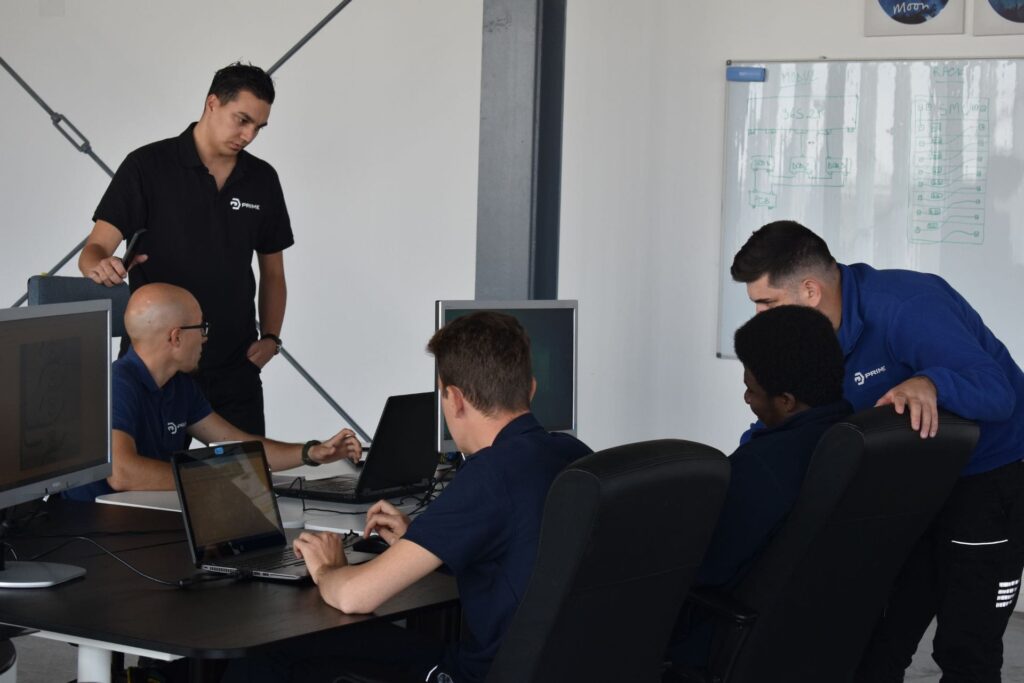
EIT InnoEnergy encourages innovation in several different areas. These fields include energy storage, transportation and mobility, renewable sources, and sustainable buildings and communities, all of which are supported by the company’s trustworthy network of more than 1200 partners and 29 shareholders. The portfolio, which has over 180 businesses, will have made 72.8 billion euros in revenue and avoided 1.1 gigatons of carbon dioxide from entering the environment by 2030.
- Published in News











